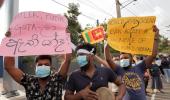Sri Lanka's main Opposition party Samagi Jana Balawegaya (SJB) on Tuesday handed over to the parliamentary Speaker motions of no-confidence against the Sri Lanka Podujana Peramuna (SLPP) coalition government and embattled President Gotabaya Rajapaksa, even as the government announced the appointment of a cabinet sub-committee to look into the proposal for a new Constitution.

"We met the Speaker at his residence and handed over two no-trust motions, the first one against the President under Article 42 of the Constitution and the other against the government," SJB general secretary Ranjith Madduma Bandara said.
Article 42 stipulates that the President is responsible to Parliament for the exercise, performance and discharge of his functions.
Madduma Bandara said the party wants the motion to be taken quickly.
The Parliament meets tomorrow for the first of eight sittings this month.
The SJB said they would field a candidate for the post of Deputy Speaker of Parliament.
The position has fallen vacant with the resignation of the incumbent Ranjith Siyamabalapitiya.
Siyamabalapitiya is part of the SLFP of the former President Maithripala Sirisena which had split from the SLPP coalition.
The main Tamil party along with the former prime minister Ranil Wickremesinghe's United National Party's (UNP) are to jointly move a no trust motion against the president, which would imply that the House had lost confidence in the President.
Experts said if the government would be defeated in the SJB motion, Prime Minister Mahinda Rajapaksa and the cabinet would have to resign.
The TNA/UNP motion has no legal binding for the President to resign.
The TNA/UNP motion against the President has no legal binding on him to resign.
"This problem can only be solved if either the President or the Prime Minister resigned. It is up to them to make a decision," former prime minister Wickremesinghe said.
Under the Article 38 of the Constitution, a president can be removed only if he/she volunteered to resign or through the long process of impeachment.
Over the weekend a flurry of political meetings took place as Mahinda Rajapaksa declined to resign in order to make way for a unity government for an interim period.
The powerful Buddhist clergy also demanded Rajapaksa's resignation to make way for an interim government.
On Tuesday, the government announced the appointment of a Cabinet sub-committee to look at the proposal for a brand new Constitution.
Prime Minister Mahinda Rajapaksa had proposed to amend the Constitution to create an accountable administration that met the people's aspirations, amid large scale protests against the government over its handling of the economy.
President Gotabaya Rajapaksa while showing reluctance to sack his older brother conveyed to parties that he would be willing to set up an all-party interim government if the parties could muster 113 majority in the 225-member assembly.
Any motion needs seven days notice before getting into the order paper for debate.
The date had to be agreed upon at the party leaders' meeting where the business of the House is agreed upon.
Both Rajapaksas are coming under increasing pressure to step down in the simmering economic meltdown where people struggle with all essentials, including having to put up with power cuts.
Urgent Indian economic assistance has provided a respite even as the government negotiates with the IMF for a bailout.
Sri Lanka is currently in the throes of unprecedented economic turmoil since its independence from Britain in 1948. The crisis is caused in part by a lack of foreign currency, which has meant that the country cannot afford to pay for imports of staple foods and fuel, leading to acute shortages and very high prices.
Thousands of demonstrators have hit the streets across Sri Lanka since April 9, as the government ran out of money for vital imports; prices of essential commodities have skyrocketed and there are acute shortages in fuel, medicines and electricity supply.










